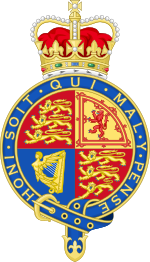| Edwards v Canada (AG) | |
|---|---|
 Arms of the Judicial Committee of the Privy Council | |
| Court | Judicial Committee of the Privy Council |
| Full case name | In the matter of a Reference as to the meaning of the word " persons " in Section 24 of The British North America Act, 1867 |
| Decided | October 18, 1929 |
| Citation | [1930] AC 124, [1929] All ER Rep 571, 1929 UKPC 86 (BAILII). |
| Case history | |
| Prior actions | Reference re Meaning of the Word "Persons" in s. 24 of the BNA Act, [1928] SCR 276 |
| Appealed from | Supreme Court of Canada |
| Court membership | |
| Judges sitting | Lord Sankey, L.C. Lord Darling Lord Merrivale Lord Tomlin Sir Lancelot Sanderson |
| Case opinions | |
| Decision by | Lord Sankey |
Edwards v Canada (AG), also known as the Persons Case (French: l'Affaire « personne »), is a Canadian constitutional case that decided in 1929 that women were eligible to sit in the Senate of Canada. The legal case was put forward by the Government of Canada on the lobbying of a group of women known as The Famous Five—Henrietta Edwards, Nellie McClung, Louise McKinney, Emily Murphy and Irene Parlby. The case began as a reference case by the federal Cabinet directly to the Supreme Court of Canada, which ruled that women were not "qualified persons" and thus ineligible to sit in the Senate. The five women then appealed to the Judicial Committee of the Imperial Privy Council in London, at that time the court of last resort for Canada within the British Empire and Commonwealth. The Judicial Committee overturned the Supreme Court's decision. (The case name lists Edwards as the lead appellant, as her name came first alphabetically.)
The Persons Case was a landmark case in two respects. The case established that Canadian women were eligible to be appointed senators and also established that the Canadian constitution should be interpreted in a way that was more consistent with the needs of society.
Some saw the eligibility of women for the senate as "radical change"; others saw it as a restoration of the original framing of the English constitutional documents, including the Bill of Rights 1689, which uses only the term "person", not the term "man" (or "woman" for that matter).
Some others have interpreted the Privy Council rule as causing a change in the Canadian judicial approach to the Canadian constitution, an approach that has come to be known as the living tree doctrine. This is a doctrine of constitutional interpretation that says that a constitution is organic and must be read in a broad and liberal manner so as to adapt it to changing times.
